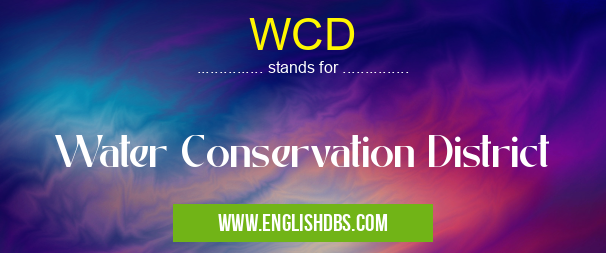What does WCD mean in CONSERVATION
WCD is an acronym that stands for Water Conservation District. Water Conservation Districts (WCDs) are special-purpose districts that are created to manage water resources within a specific geographic area. WCDs are typically responsible for developing and implementing water conservation plans, managing water rights, and providing water-related services to their constituents.

WCD meaning in Conservation in Community
WCD mostly used in an acronym Conservation in Category Community that means Water Conservation District
Shorthand: WCD,
Full Form: Water Conservation District
For more information of "Water Conservation District", see the section below.
Functions of WCDs
- Water Conservation: WCDs develop and implement water conservation plans to reduce water use and promote sustainable water practices. They may offer incentives to encourage water-efficient landscaping, appliances, and irrigation techniques.
- Water Rights Management: WCDs manage water rights within their jurisdiction, ensuring that water is allocated and used fairly and efficiently. They may issue permits for water use and enforce water rights laws.
- Water-Related Services: WCDs provide a variety of water-related services to their constituents, such as:
- Flood control
- Watershed protection
- Water quality monitoring
- Recreation and open space management
Essential Questions and Answers on Water Conservation District in "COMMUNITY»CONSERVATION"
What is a Water Conservation District (WCD)?
A WCD is a special-purpose district or agency created to manage water resources within a specific geographic area. WCDs typically have the authority to plan, construct, operate, and maintain water infrastructure, including reservoirs, pipelines, and canals. They also often have the power to regulate water use and to impose water conservation measures.
What is the purpose of a WCD?
The primary purpose of a WCD is to ensure a reliable and sustainable water supply for its customers. WCDs work to protect water quality, prevent flooding, and promote water conservation. They also play a role in economic development by providing water for businesses and industries.
How are WCDs funded?
WCDs are typically funded through a combination of property taxes, water rates, and grants. Some WCDs also receive funding from state or federal agencies.
Who governs WCDs?
WCDs are typically governed by a board of directors elected by the voters within the district. The board of directors is responsible for setting policy and overseeing the operation of the WCD.
What are some of the challenges facing WCDs?
WCDs face a number of challenges, including climate change, population growth, and water scarcity. Climate change is leading to more extreme weather events, such as droughts and floods, which can put a strain on water resources. Population growth is also increasing the demand for water, while water scarcity is becoming a more common problem in many parts of the world.
Final Words: WCDs play a vital role in managing water resources and promoting water conservation. They are responsible for ensuring that water is used efficiently and fairly within their jurisdiction. By implementing water conservation plans, managing water rights, and providing water-related services, WCDs help to protect and preserve water resources for future generations.
WCD also stands for: |
|
| All stands for WCD |
